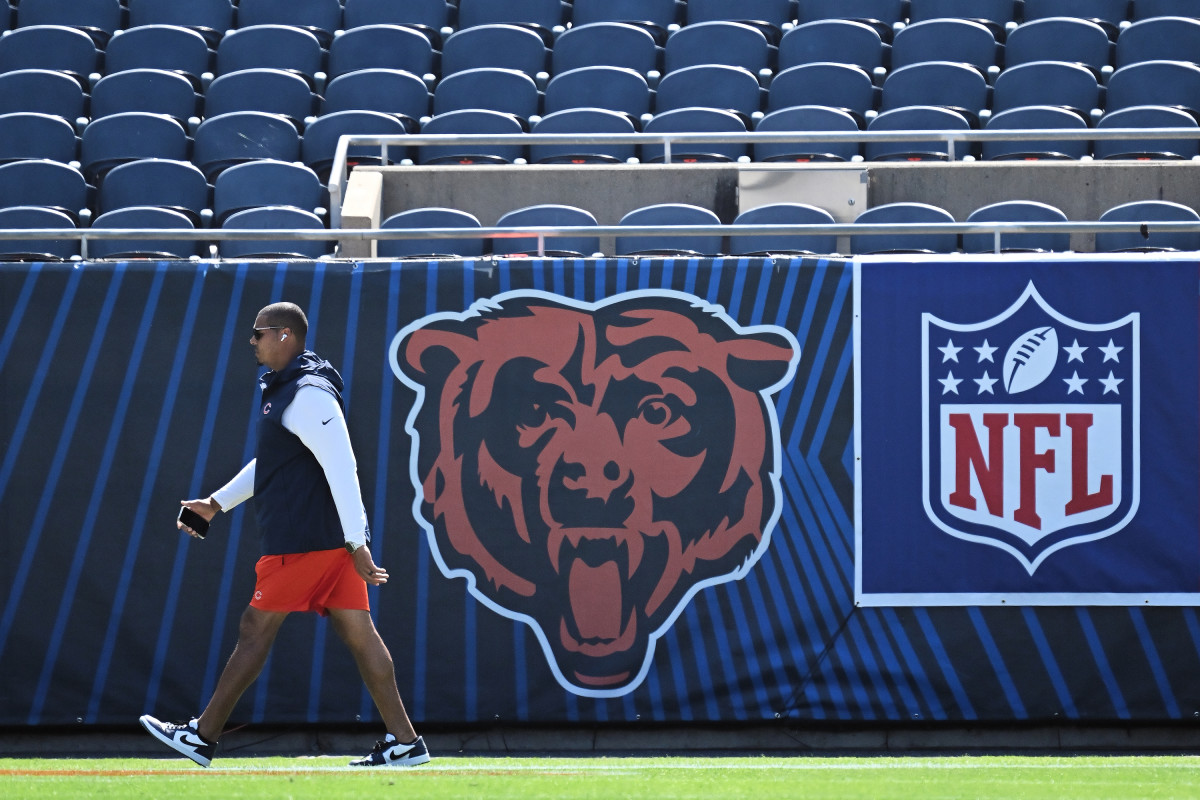The Bears’ Thought Process at the Trade Deadline Seems Devoid of Logic

Today’s typical sports fan, like today’s coach and executive, is more sophisticated than ever before. Statistics are better and more readily accessible. Positional value and cost-benefit analysis are part of every intelligent conversation about major roster moves. Reasonable fans understand that no team nails every move and that most teams don’t win championships. But fans at least want to see the logic behind an approach. This is what must make it so frustrating to be a Bears fan right now.
In the past 12 months, Bears general manager Ryan Poles has:
- Traded a second-round pick for receiver Chase Claypool when they were 3–5.
- Declined to even really consider using the No. 1 pick in the draft on a quarterback because they had Justin Fields.
- Traded a second-round pick for defensive end Montez Sweat when they are 2–6 and (see No. 2) probably do not have a long-term quarterback solution on the roster.
These are not the only moves Poles has made, of course. But they are the ones that make you go: What are the Bears trying to do here?

Looking through every in-season trade going back to 2017, I could find two teams that were highly unlikely to make the playoffs and traded a first- or second-round pick: the Bears and the Bears. Sometimes buyers ended up missing the playoffs, like when the ’19 Steelers acquired Minkah Fitzpatrick or the Rams traded for Jalen Ramsey that same year. But Pittsburgh and Los Angeles had reason to believe they were playoff teams (the latter was coming off a Super Bowl appearance), Fitzpatrick was in only the second year of his rookie contract and Ramsey was a proven superstar under team control for at least another year. Sweat’s contract will be up after this season.
There is a reason bad teams are not usually buyers: When you acquire a player midseason, his expected performance for the rest of that year factors into the cost. The Bears paid for nine games of Sweat that won’t help them make the playoffs—and they assume the injury risk of those games, too.
The best-case scenario is that Sweat stays healthy, plays well and signs a long-term deal with Chicago. And that’s very possible; the Bears have plenty of cap room and can franchise-tag him if need be. But even then, they will have used top-of-the-market money and a second-round pick for a very good player. Sweat averaged roughly one sack every two games playing for a Washington team with a lot of talent on its defensive line.
The Claypool move was an obvious mistake in hindsight (the Bears traded him to Miami for a sixth-round pick), but it seemed like a mistake at the time, too.
My problem in sticking with Fields was not the outcome as much as the process. The top priority for every NFL executive is finding a franchise quarterback, and the most common way to do that is to pick one near the top of the draft. The Bears seemed to favor Fields over Bryce Young and C.J. Stroud (and Anthony Richardson and Will Levis) because he was already there. That is not a good reason to choose a quarterback.
These three moves are not the totality of Poles’s tenure, of course. In the same month he acquired Claypool, he traded linebacker Roquan Smith to Baltimore for a second-round pick. (Whether Poles should have kept Smith or gotten more for him is a separate discussion.)
It is also worth noting that franchise dynamics are almost always more complicated than they appear from the outside. Every general manager and coach is on the clock, and they all have to please their owner and maintain the trust of employees in the locker room. You and I might think the 2023 Bears are a lost cause, but Poles and coach Matt Eberflus have to be careful about acting like they are.
Also, Poles’s moves might lead to the Bears’ getting the No. 1 pick next spring—they have their own and Carolina’s—and drafting USC quarterback Caleb Williams. That would be a happy ending that would probably make all of this worthwhile. But it would also be a lucky ending. It was not the plan last winter.
Sometimes teams thrive because they zag when everyone else zigs. More often, they are just caught in a cycle of losing. The Bears may prove to be contrarian geniuses, but right now they’re just contrarian.
